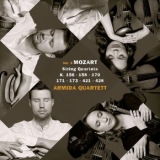Bekanntlich soll man nicht mitten im Fluss die Pferde wechseln. Oder anders ausgedrückt, einer einmal eingeschlagenen Linie soll man treu bleiben. Diesen beiden Leitlinien sind die vier Mitglieder des Armida Quartetts in bester Art und Weise gefolgt. War bei den Kritiken für die ersten vier Ausgaben der Gesamteinspielung der Quartette von Mozart davon die Rede, dass sie dem klassischen Mozart Bild treu bleiben oder dass sie Mozart selber sprechen lassen und sich nicht interpretatorisch in den Vordergrund drängen, so setzen sie in der fünfen Ausgabe diesen Stil ohne Brüche fort.
Mit den ausstehenden sieben Quartetten, den Nummern 3, 5, 10, 11, 13, 15 und 16, decken sie noch einmal eine Breite der kompositorischen Entwicklung ab. Wiederum halten sie sich auf befestigten Wegen und suchen kein Abenteuer. Aber sie sehen die sozusagen die Blüten am Wegesrand und folgen dem Flug der Insekten. Kurzum, sie nehmen alle Details wahr und lassen uns durch ihr Spiel daran teilhaben. Dabei mag man die frühen Quartette auch als ein wenig dezent empfinden oder ein Adagio auch mal fast als Largo. Die mittleren Werke dieser Ausgabe locken dagegen mit keckem und munterem, gelegentlich auch deutlicher akzentuiertem Spiel. Bei den beiden Werken in d-Moll und Es-Dur zeigen sie dann die große ausgereifte Kunst der Komposition und auch ihrer ausgewogenen Ensemblekultur in bestem Einvernehmen miteinander.
So runden sie in bester Manier die Einspielungen in einem großen interpretatorischen Bogen ab. Und das ist ihnen gelungen, obwohl sie die Aufnahmen und Veröffentlichungen auf mehrere Jahre verteilt haben. Das zeugt von hoher Disziplin, interpretatorischer Weitsicht und durchgehaltener Spielkultur.
As is well known, one should not change horses in the middle of the river. Or, to put it another way, one should remain true to a line once it has been taken. The four members of the Armida Quartet have followed these two guidelines in the best possible way. If the reviews for the first four editions of the complete recording of Mozart’s quartets spoke of their remaining faithful to the classical Mozart image or of their letting Mozart himself speak and not forcing themselves interpretatively into the foreground, in the fifth edition they continue this style without breaks.
With the outstanding seven quartets, numbers 3, 5, 10, 11, 13, 15 and 16, they once again cover a breadth of compositional development. Again, they keep to paved paths and do not seek adventure. But they see the blossoms by the wayside, so to speak, and follow the flight of insects. In short, they perceive all the details and let us participate in them through their playing. One may find the early quartets a bit discreet or an Adagio almost a Largo. The middle works in this edition, on the other hand, entice with perky and lively, occasionally more clearly accented playing. In the two works in D minor and E-flat major the four musicians then show the great mature art of composition and also of their well-balanced ensemble culture in best harmony with each other.
Thus, in the best manner, they round out the recordings in a great interpretive arc. And they have succeeded in doing so, even though they have spread the recordings and releases over several years. This testifies to a high level of discipline, interpretative foresight and a consistent playing culture.
























